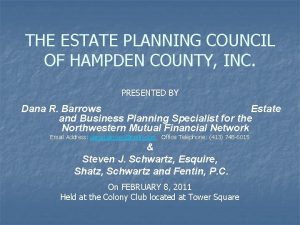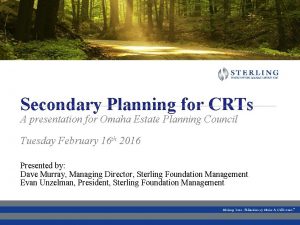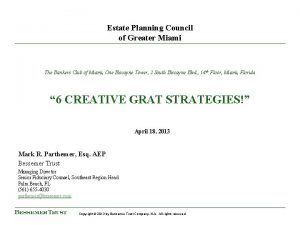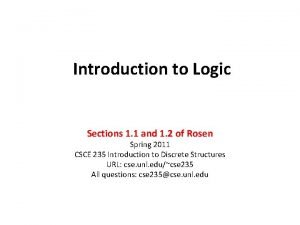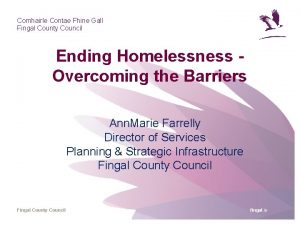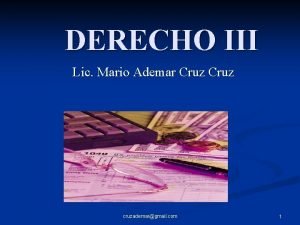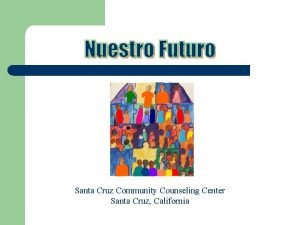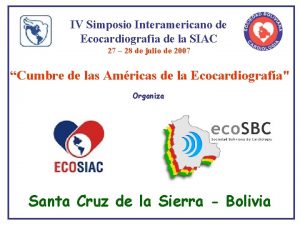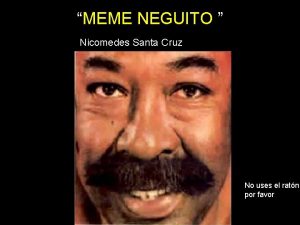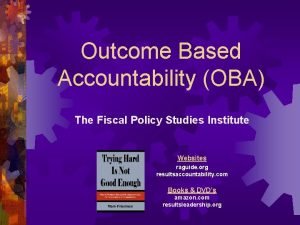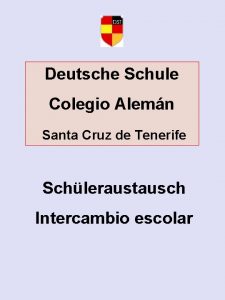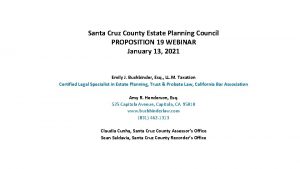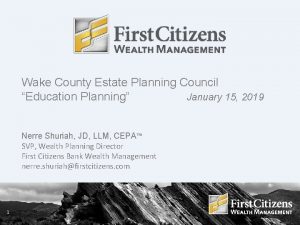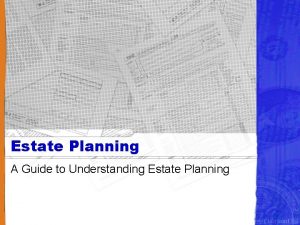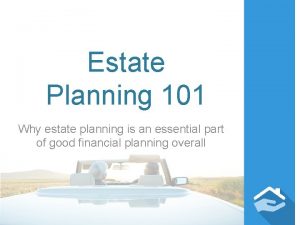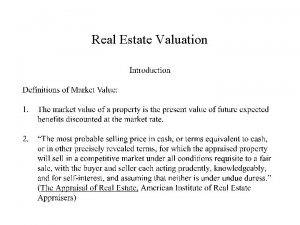Santa Cruz County Estate Planning Council PROPOSITION 19

























- Slides: 25

Santa Cruz County Estate Planning Council PROPOSITION 19 WEBINAR January 13, 2021 Emily J. Buchbinder, Esq. , LL. M. Taxation Certified Legal Specialist in Estate Planning, Trust & Probate Law, California Bar Association Amy R. Henderson, Esq. 525 Capitola Avenue, Capitola, CA 95010 www. buchbinderlaw. com (831) 462 -1313 Claudia Cunha, Santa Cruz County Assessor’s Office Sean Saldavia, Santa Cruz County Recorder’s Office

AGENDA 1. Review of basic concepts (assessed value, appraised value, capital gains) and current law. 2. Changes to rules under Proposition 19. 3. Step-Up in Basis/Inclusion in Decedent’s estate under the IRC. 4. Change in Ownership under existing BOE rules and annotations. 5. Potential work-arounds. 6. Questions for Ms. Cunha and Mr. Saldavia. 7. Open forum for discussion. 2

DISCLAIMER • This presentation discusses only the aspects of Proposition 19 that relate to transfers of real property from parents to children and grandparents to grandchildren. • Emily Buchbinder and Amy Henderson do not purport to be experts on Proposition 19. Any possible work-arounds (discussed later) have risks involved because the BOE has not issued any guidance. • Ms. Cunha and Mr. Saldavia may not be able to answer all of your questions with certainty for the same reason that the BOE has not issued any guidance. 3

WHY ARE WE HERE TODAY? Clients who own real estate in California want to pass the property to their children without property taxes increasing on transfer. These clients also want to know if there is a work-around that will also allow for the property to receive a step-up in cost basis on the client’s death. Attorneys want to find a work-around for clients, or to at least be able to advise them of the options and risks. Attorneys want to ask questions to Ms. Cunha and Mr. Saldavia about the technicalities of recording and filing documents in a timely manner. 4

PROPERTY TAX BASICS Property Tax • Assessed value in real estate is established when the property is purchased (“Base Year”). Property tax is 1% (plus) of the fair market value. Under Proposition 13, the Assessor can increase your property taxes by a maximum of 2% each year (not including special assessments). The current assessed value of real estate appears on the property tax bill. • Appraised value (also known as fair market value) is what a willing buyer would pay to purchase real estate from a willing seller in an arm’s-length transaction. • Change in Ownership occurs when real property is transferred from one or more owners to a third party, unless one of the exceptions apply. If an exception does not apply, the property will be reassessed. 5

CAPITAL GAINS TAX BASICS Capital Gain • Cost Basis is the purchase price of an asset. For rental property, the cost basis is reduced each year by the amount of depreciation claimed on the owner’s tax return. • Capital Gain Tax is imposed when an asset is sold for more than its cost basis. Currently, the maximum federal capital gains tax is as low as 15% and as high as 23%. In California, capital gains are taxed as ordinary income, so the rate depends on the owner’s adjusted gross income. The maximum capital gains tax rate is 13. 3% (taxable income in excess of $1 million for married couple). 6

STEP-UP IN COST BASIS ON DEATH IRC § 1014 (a)IN GENERAL Except as otherwise provided in this section, the basis of property in the hands of a person acquiring the property from a decedent or to whom the property passed from a decedent shall, if not sold, exchanged, or otherwise disposed of before the decedent’s death by such person, be— (1)the fair market value of the property at the date of the decedent’s death, (2)in the case of an election under section 2032, its value at the applicable valuation date prescribed by such section, (3)in the case of an election under section 2032 A, its value determined under such section, or (4)to the extent of the applicability of the exclusion described in section 2031(c), the basis in the hands of the decedent. (b)PROPERTY ACQUIRED FROM THE DECEDENT For purposes of subsection (a), the following property shall be considered to have been acquired from or to have passed from the decedent: (1)Property acquired by bequest, devise, or inheritance, or by the decedent’s estate from the decedent; (2)Property transferred by the decedent during his lifetime in trust to pay the income for life to or on the order or direction of the decedent, with the right reserved to the decedent at all times before his death to revoke the trust; (3)In the case of decedents dying after December 31, 1951, property transferred by the decedent during his lifetime in trust to pay the income for life to or on the order or direction of the decedent with the right reserved to the decedent at all times before his death to make any change in the enjoyment thereof through the exercise of a power to alter, amend, or terminate the trust; (4)Property passing without full and adequate consideration under a general power of appointment exercised by the decedent by will; 7

WHEN ARE PROPERTY TAXES REASSESSED UNDER CURRENT LAW? When there is a change in ownership of real estate, the Assessor reassesses the property based on its fair market value, unless it falls under an exception to that rule. (Not all exceptions are listed. ) • Exception 1: Transfers between spouses and domestic partners. • Exception 2: Transfers between parents and children (Prop 58) and between parents and grandchildren (Prop 193). • Under current law, a parent may transfer his/her principal residence to a child and the Assessor will not reassess the property taxes. The child can use the house as a vacation home or rental. In addition, a parent can transfer other real estate (including commercial property) to a child of up to $1, 000 in assessed value. Transfers may occur during life or at death. • Exception 3: Transfers for persons over age 55 (limits apply). (Props 60/90). • Exception 4: Transfers within an entity (rules discussed later). 8

EXAMPLE 1 UNDER CURRENT LAW Parent-Child Transfer • Surviving spouse dies with a home (principal residence) and one rental. She has one child who will inherit everything. • Principal residence: The property taxes will not be reassessed on transfer of the principal residence to child, regardless of use. The new cost basis is the appraised value of the property. • Rental property: The rental was purchased in 1976 and currently has an assessed value of $200, 000. Property taxes are $2, 000+ (not including special assessments) per year. Even though the rental is appraised at $1, 500, 000 on the surviving spouse’s death, this property will not be reassessed. The new cost basis for child is $1, 500, 000. Child may depreciate the improvements on the land at the higher cost basis. If child sells the property in the future for $1, 700, 000, capital gains tax will be imposed on $200, 000 (or more if child depreciated the property). 9

EXAMPLE 2 UNDER CURRENT LAW Parent-Grandchild Transfer • Surviving spouse dies (“grandmother”) with a home (principal residence) and one rental. Her only child (“daughter”) predeceased her, leaving one child (“grandchild”). Grandchild’s mother and father were divorced when the daughter died. Grandmother leaves home and rental to grandchild. • Principal residence: The property taxes will not be reassessed on transfer of the principal residence to grandchild, regardless of use. The new cost basis is the appraised value of the property. • Rental property: The rental was purchased in 1976 and currently has an assessed value of $200, 000. The rental will not be reassessed. The new cost basis for child is appraised value. • Note: If grandchild’s father was married to daughter when daughter died, had not remarried on date of transfer, and survived grandmother, the property would be reassessed. 10

IMPORTANT RECORDING/FILING DATES • Deeds must be executed on or before 2/15/21. They may be recorded after that date. (WE STRONLY RECOMMEND THAT DEEDS BE RECORDED BY FEBRUARY 12. ) • PCOR should be submitted when deed is recorded. • BOE-58 must be filed within 3 years of transfer. 11

PROPOSITION 19 • A parent may transfer his/her principal residence/family farm to a child provided that the child uses the parent’s the property as his/her own principal residence. HOWEVER, there may be a partial reassessment of the property taxes. • A principal residence is where an individual resides. It is the address that appears on a driver’s license and tax returns. • To calculate the new value for reassessment purposes, add $1, 000 to the current assessed value of the principal residence. If the fair market value is equal or less than that sum, there will be no reassessment. If it is greater than that sum, it will be partially reassessed. The reassessment is imposed on the difference between the fair market value and the sum of the current assessed value plus $1, 000. • Child must file Homeowner’s Exemption form (BOE 266) within one year of transfer. • All other transfers of real property to children will be reassessed. 12

EXAMPLE UNDER NEW LAW • Surviving spouse dies on February 16, 2021 with a home and one rental. She has one child who will inherit everything. The assessed value on parent’s death is $200, 000. The appraised/fair market value is $1, 500, 000. The first $1, 200, 000 will not be reassessed if the child uses the home as his/her principal residence. The excess over that amount ($300, 000) will be reassessed. The property tax bill will increase by a little more than $3, 000 in the first year. • The rental will be entirely reassessed, as no exception applies. 13

DEATH OF PARENT ON OR BEFORE FEBRUARY 15, 2021 • Transfer is deemed to have occurred on the date of parent’s death, even if no deed transferring the property to the child has been recorded. • Don’t tell your clients’ children! �� 14

PRINCIPAL RESIDENCE HAS MORE THAN ONE PARCEL NUMBER • If the principal residence/family farm has two or more parcel numbers, only ONE parcel may be eligible for the parent-child exclusion NOW and under Proposition 19. 15

SHOULD YOUR CLIENTS TRANSFER REAL ESTATE TO THEIR CHILDREN PRIOR TO FEBRUARY 11, 2021? • Financial considerations. If client transfers real estate to child, they are also transferring the income stream from that property. Does your client have adequate resources to support him/herself now and in the future? Long-term health care insurance and client’s other assets may not be adequate to cover existing expenses and future costs of care. • Legal implications. If client transfers principal residence to child, child has the legal right to charge parent and/or evict parent. Child can sell the property. • Cost basis. If client transfers real estate to child during life, child’s cost basis in the property is parent’s cost basis in the property. When parent dies, the property will not receive a step-up in basis because parent was not the owner on death. If child plans to sell the real estate, there will be greater capital gains tax to pay as a result of the transfer during parent’s lifetime. The decision whether to transfer may depend on whether child plans to continue owning the property or sell it after parent dies. • Tax filing requirements. If client gifts property during life, s/he must have the property appraised by a certified appraiser and file a gift tax return, even if no tax is due. If client transfers primary residence to child but child does not charge rent, child should file gift tax return. 16

Inclusion of Property in Estate of Decedent (resulting in step-up in basis on death) IRC § 2036 (a)GENERAL RULE The value of the gross estate shall include the value of all property to the extent of any interest therein of which the decedent has at any time made a transfer (except in case of a bona fide sale for an adequate and full consideration in money or money’s worth), by trust or otherwise, under which he has retained for his life or for any period not ascertainable without reference to his death or for any period which does not in fact end before his death— (1)the possession or enjoyment of, or the right to the income from, the property, or (2)the right, either alone or in conjunction with any person, to designate the persons who shall possess or enjoy the property or the income therefrom. (b)VOTING RIGHTS (1)IN GENERAL For purposes of subsection (a)(1), the retention of the right to vote (directly or indirectly) shares of stock of a controlled corporation shall be considered to be a retention of the enjoyment of transferred property. (2)CONTROLLED CORPORATION For purposes of paragraph (1), a corporation shall be treated as a controlled corporation if, at any time after the transfer of the property and during the 3 -year period ending on the date of the decedent’s death, the decedent owned (with the application of section 318), or had the right (either alone or in conjunction with any person) to vote, stock possessing at least 20 percent of the total combined voting power of all classes of stock. (3)COORDINATION WITH SECTION 2035 For purposes of applying section 2035 with respect to paragraph (1), the relinquishment or cessation of voting rights shall be treated as a transfer of property made by the decedent. 17

Inclusion of Property in Estate of Decedent (resulting in step-up in basis on death) IRC § 2038 (a)IN GENERAL The value of the gross estate shall include the value of all property—To the extent of any interest therein of which the decedent has at any time made a transfer (except in case of a bona fide sale for an adequate and full consideration in money or money’s worth), by trust or otherwise, where the enjoyment thereof was subject at the date of his death to any change through the exercise of a power (in whatever capacity exercisable) by the decedent alone or by the decedent in conjunction with any other person (without regard to when or from what source the decedent acquired such power), to alter, amend, revoke, or terminate, or where any such power is relinquished during the 3 year period ending on the date of the decedent’s death. 18

BOE Rule 462. 260 D Date of Change in Ownership (d) TRUSTS. (1) Revocable. The date the trust becomes irrevocable. Example 1: A creates an inter vivos revocable trust that becomes irrevocable upon A's death. The date of trust in ownership is the date of A's death. (2) Irrevocable. (A) The date the property is placed in trust. Example 2: A's estate plan provides that upon A's death, property is transferred to an irrevocable testamentary trust. The date of change in ownership is the date of A's death. Example 3: A transfers to an irrevocable inter vivos trust. The date of change in ownership is the date of the transfer. (B) The effective date of the immediate right to present possession or enjoyment of a remainder or reversion occurs upon the termination of a life estate or other similar precedent property interest. Example 4: A creates an irrevocable trust, granting A's wife, B, a life estate in the beneficial use of the property with a remainder to C and D who are unrelated to A and B. The creation of a life estate in B is a transfer subject to the interspousal exclusion from change in ownership. Upon B's death, however, a change in ownership occurs because on that date C and D have an immediate right to the present possession and enjoyment of the remainder. 19

BOE Annotations on When CIO Occurs • Entities or Trusts will be considered “see-through” for purposes of property tax • Present income beneficiary is the “owner” even if their interest is defeasible (Rule 462. 160) • 625. 0220 Trusts. A transfer of property to an irrevocable trust which grants a defeasible life estate to some of the trustors' children and a defeasible remainder interest to others qualifies for the parent/child exclusion contained in Revenue and Taxation Code section 63. 1. The transfer to the trust may be gratuitous or for consideration and the life estate may be measured by the life of the trustor or one or more of the beneficiaries. • 625. 0203 Trusts. The parent-child exclusion applies to transfers of real property interests into irrevocable trusts that are for the sole benefit of one or more children of the eligible transferor parent, even though the trustee has the discretion to accumulate trust income and principal. • 625. 0204 Trusts. The transfer of real property to a trust with directions that the trustee withhold distribution of the property and any income it earns until the happening of a specified event, such as the death of the trustor or the reaching of a particular age by the beneficiary, constitutes a transfer of a present interest in the property, and as such, does not prevent the application of the parent-child exclusion, provided that no other person has any intervening right, title, or interest in the property or income of the trust. C 3/23/1992. 20

IS THERE A WORK-AROUND? • Can client give rentals to child and contract with child to receive rents during client’s lifetime? If client retains a legal right to receive income, it will be included in the parent’s estate on death under IRC § 2036(a)(1). California Evidence Code § 662 states that “[t]he owner of the legal title to property is presumed to be the owner of the full beneficial title. This presumption may be rebutted only by clear and convincing proof. ” Child is on title, but does s/he own the full beneficial title? Is this arrangement violating the assignment of income doctrine? The assignment of income doctrine states that the taxpayer who earns the income must pay the tax on that income, even if he gave the right to collect the income to another person. Since client is retaining the beneficial use of the property, can the assumption be rebutted by further BOE guidance? 21

IS THERE A WORK-AROUND? Can client transfer the property to an irrevocable trust and retain the right to change the beneficiaries? Under IRC §§ 2036 (a) and 2036(b), this transfer will cause inclusion in the decedent’s estate. Will that satisfy the requirements of BOE Annotation 625. 0220? (A transfer of property to an irrevocable trust which grants a defeasible life estate to some of the trustors' children and a defeasible remainder interest to others qualifies for the parent/child exclusion contained in Revenue and Taxation Code section 63. 1. The transfer to the trust may be gratuitous or for consideration and the life estate may be measured by the life of the trustor or one or more of the beneficiaries. ) 22

IS THERE A WORK-AROUND? Can ownership in a legal entity avoid reassessment on parent’s death? • CIO within a legal entity (corp. , partnership, LLC) occurs when • (1) A transfer of ownership interests in an entity where a person or entity acquires more than 50 percent of the ownership interest in a legal entity. This type of transfer is referred to as a change in control (See R&T Code section 64(c)) For an example, refer to Property Tax Rule 462. 180(d). • (2) This type of transfer is referred to as a cumulative transfer of original co-owners’ interests (commonly referred to as a change in ownership). (See Revenue and Taxation Code section 64(d)) For an example, refer to Property Tax Rule 462. 180(d)(2): Ex: #8. • Parent retains 49% ownership of property and transfers the other 51% to child (on or before 2/15/21). Parent and child form LLC and transfer their respective interests to the LLC. Parent’s death does not result in change in control or a change in more than 50% within that legal entity. 49% of the property receives a step-up in basis under IRC § 1014. (Does entire 49% get step-up in basis? ) • Caution: The transfer may trigger the “Due on Sale” clause if there is a loan. 23

Can BOE change these rules? When is the transfer complete? Date of recording or date of signing? QUESTIONS SUMBITTED PRIOR TO PRESENTATION NOW WE TURN TO MS. CUNHA AND MR. SALDAVIA! 24

Santa Cruz County Estate Planning Council PROPOSITION 19 WEBINAR January 13, 2021 Emily J. Buchbinder, Esq. , LL. M. Taxation Certified Legal Specialist in Estate Planning, Trust & Probate Law, California Bar Association Amy R. Henderson, Esq. 525 Capitola Avenue, Capitola, CA 95010 www. buchbinderlaw. com (831) 462 -1313 Claudia Cunha, Santa Cruz County Assessor’s Office Sean Saldavia, Santa Cruz County Recorder’s Office
 Montgomery county estate planning council
Montgomery county estate planning council Estate planning council of birmingham
Estate planning council of birmingham Omaha estate planning council
Omaha estate planning council Chicago estate planning council
Chicago estate planning council Bankers club miami
Bankers club miami Proposition examples sentences
Proposition examples sentences Lancashire county council apprenticeships
Lancashire county council apprenticeships Fingal county council planning
Fingal county council planning Mario ademar cruz cruz
Mario ademar cruz cruz Uc santa cruz counseling center
Uc santa cruz counseling center Stacy o'farrell santa cruz
Stacy o'farrell santa cruz Siacvi
Siacvi Santa cruz gis
Santa cruz gis Playa azul santa cruz
Playa azul santa cruz Vierge de santa cruz oran
Vierge de santa cruz oran Karilyo halimbawa
Karilyo halimbawa Meme neguito nicomedes santa cruz
Meme neguito nicomedes santa cruz Kaiser permanente santa cruz
Kaiser permanente santa cruz Viksund 340 st cruz flybridge
Viksund 340 st cruz flybridge Medical assistant program rop
Medical assistant program rop Oba santa cruz
Oba santa cruz Deutsche schule tenerife
Deutsche schule tenerife Santa cruz de san saba map
Santa cruz de san saba map Misterios del rosario al sagrado corazón
Misterios del rosario al sagrado corazón Imagen del primer misterio gozoso
Imagen del primer misterio gozoso Jason hajduk
Jason hajduk
